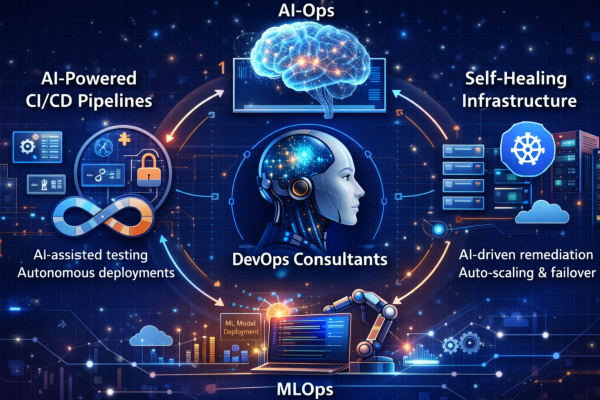How Do DevOps Services Improve Software Development?
In today’s fast-paced software industry, businesses need to deliver products faster, with higher quality and more efficiency. This is where DevOps Consulting Services come into play. DevOps Services integrates the development and operations teams, leading to streamlined processes, faster delivery, and higher-quality software. But how exactly do these services improve software development? In this blog, we’ll break down the benefits of DevOps Services and explain how they transform the software development lifecycle.
What Are DevOps Services?
Before diving into the ways DevOps Services improve software development, it’s essential to understand what they entail. DevOps is a combination of “Development” and “Operations,” a set of practices aimed at improving the collaboration between software developers and IT operations. The goal is to automate workflows, improve efficiency, and shorten the software development lifecycle.
DevOps Consulting Services in Mohali help organizations adopt these practices effectively, ensuring they implement the right tools, processes, and culture for a successful DevOps transformation.
Key Benefits of DevOps in Software Development
Faster Time to Market
One of the biggest advantages of using DevOps Consulting Services is the reduced time it takes to bring software to market. DevOps promotes automation, continuous integration (CI), and continuous delivery (CD), which accelerates the development pipeline. Instead of waiting for one phase of the project to finish before starting the next, DevOps allows for parallel workflows. This results in faster development, testing, and deployment cycles.
Continuous Integration and Continuous Delivery (CI/CD)
CI/CD pipelines are core components of DevOps practices. With continuous integration, code changes are automatically tested and merged, reducing the risk of errors. Continuous delivery, on the other hand, ensures that the software is always in a deployable state, enabling quick and reliable releases.
By integrating CI/CD pipelines through DevOps Consulting Services, organizations can quickly respond to market changes, customer demands, and even security vulnerabilities without causing major disruptions.
Improved Collaboration and Communication
Traditionally, development and operations teams worked in silos, often leading to miscommunication and delays. DevOps Consulting Services help bridge this gap by fostering better collaboration. Development and operations teams work together from the start of the project, sharing responsibilities and information. This close collaboration leads to smoother workflows and more effective problem-solving.
Enhanced Code Quality
DevOps emphasizes continuous testing, ensuring that code is tested at every stage of development. Automated testing tools are integrated into the CI/CD pipeline, allowing for early detection of bugs and errors. By catching issues early in the development process, developers can fix them before they become larger problems, leading to higher-quality code and fewer defects in production.
How DevOps Services Improve Specific Areas of Software Development?
Automation of Repetitive Tasks
One of the main ways DevOps Consulting Services improve software development is through automation. Tasks like testing, deployment, and monitoring, which were previously done manually, can now be automated. Automation reduces human error, speeds up processes, and frees up teams to focus on more strategic tasks like innovation and problem-solving.
Better Resource Utilization
With the help of DevOps, organizations can make better use of their resources. Automated scaling, for example, ensures that resources are allocated dynamically based on the workload. This not only optimizes resource usage but also reduces costs, making the development process more efficient.
Continuous Monitoring and Feedback
DevOps Services provide continuous monitoring tools that help track performance in real time. This allows development teams to receive immediate feedback on their code and make adjustments as needed. Continuous monitoring also helps identify and resolve issues in production before they affect the end-user, improving the overall user experience.
More Frequent Software Releases
One of the goals of DevOps is to enable more frequent releases of software updates. Through automated pipelines and efficient collaboration, organizations can release new features, bug fixes, and security patches more frequently. This not only keeps the software up-to-date but also improves customer satisfaction, as they receive the latest updates regularly.
DevOps and Cloud Integration
Scalability
DevOps Consulting Services often work hand in hand with cloud infrastructure. The cloud allows for scalability, ensuring that applications can handle sudden increases in user demand. By integrating DevOps with cloud services, organizations can scale their infrastructure up or down as needed, without affecting the software’s performance or availability.
Flexibility in Deployment
With cloud services, deployment is no longer tied to physical servers. DevOps Services make it easier to deploy software across multiple environments, such as staging, testing, and production. This flexibility ensures that software can be released without downtime, even in complex, distributed systems.
Disaster Recovery and Backups
The integration of cloud services with DevOps also improves disaster recovery. Automated backups and failover mechanisms ensure that, in the event of a failure, systems can be quickly restored. This minimizes downtime and reduces the risk of data loss, contributing to a more resilient software development process.
Security Enhancements through DevOps (DevSecOps)
Integrating Security into Development
Security is an essential component of software development, and DevOps Consulting Services can help integrate security practices directly into the development lifecycle. This is often referred to as DevSecOps. In a traditional development model, security was usually addressed late in the project, often causing delays or requiring significant rework.
DevOps Services shift security left, meaning security is considered from the very beginning of the project. This proactive approach helps identify potential vulnerabilities early, leading to more secure applications.
Automated Security Testing
DevOps Services can include automated security testing tools that run alongside functional tests in the CI/CD pipeline. These tools check for vulnerabilities, misconfigurations, and other security risks in real-time. As a result, security becomes an integral part of the development process, rather than an afterthought.
Compliance and Auditing
For organizations that need to comply with industry regulations (such as GDPR or PCI DSS), DevOps Consulting Services can help automate compliance checks. This ensures that applications adhere to security standards without the need for manual audits. Continuous monitoring and logging also make it easier to track compliance, further streamlining the software development process.
The Role of DevOps Tools in Improving Software Development
Version Control Systems
Version control tools like Git are essential in DevOps environments. They allow teams to collaborate on code, track changes, and roll back to previous versions if necessary. DevOps Consulting Services ensure that version control is properly implemented, reducing the risk of errors and ensuring that development runs smoothly.
Containerization with Docker and Kubernetes
Containers are a key part of DevOps infrastructure. Tools like Docker and Kubernetes help package applications and their dependencies into isolated environments. This ensures that software runs consistently across different environments, reducing the “it works on my machine” problem that developers often face.
By leveraging containerization, DevOps Consulting Services help organizations achieve consistency, scalability, and portability in their applications.
Configuration Management Tools
Tools like Ansible, Chef, and Puppet are used to automate the configuration of systems and environments. DevOps Consulting Services implement these tools to ensure that infrastructure is consistent and repeatable. This reduces the time and effort required to manage environments and ensures that development teams can focus on building software.
DevOps and Agile Methodology
Aligning DevOps with Agile Practices
Agile methodology and DevOps complement each other, both aiming for faster delivery and flexibility. DevOps Consulting Services often help organizations integrate DevOps with Agile practices, ensuring that development cycles are not only fast but also adaptable to changing requirements.
Faster Feedback Loops
Agile emphasizes short development cycles (sprints) and constant feedback. DevOps enhances this by automating the feedback loop. With continuous integration, delivery, and monitoring, development teams can quickly see the impact of their changes, make adjustments, and move on to the next task.
Conclusion
DevOps Services have revolutionized software development by automating processes, improving collaboration, and integrating security into the workflow. Through practices like continuous integration, continuous delivery, and automation, DevOps Consulting Services helps organizations deliver higher-quality software at a faster pace.
Whether it’s faster time to market, better resource utilization, or improved security, DevOps offers numerous advantages that can transform the software development lifecycle for the better.
If you’re looking to optimize your software development process, adopting DevOps Consulting Services is a crucial step toward achieving more efficient, secure, and high-quality software releases.
By leveraging the power of DevOps, your development teams can not only meet customer demands but also stay ahead in an increasingly competitive market.
Author







